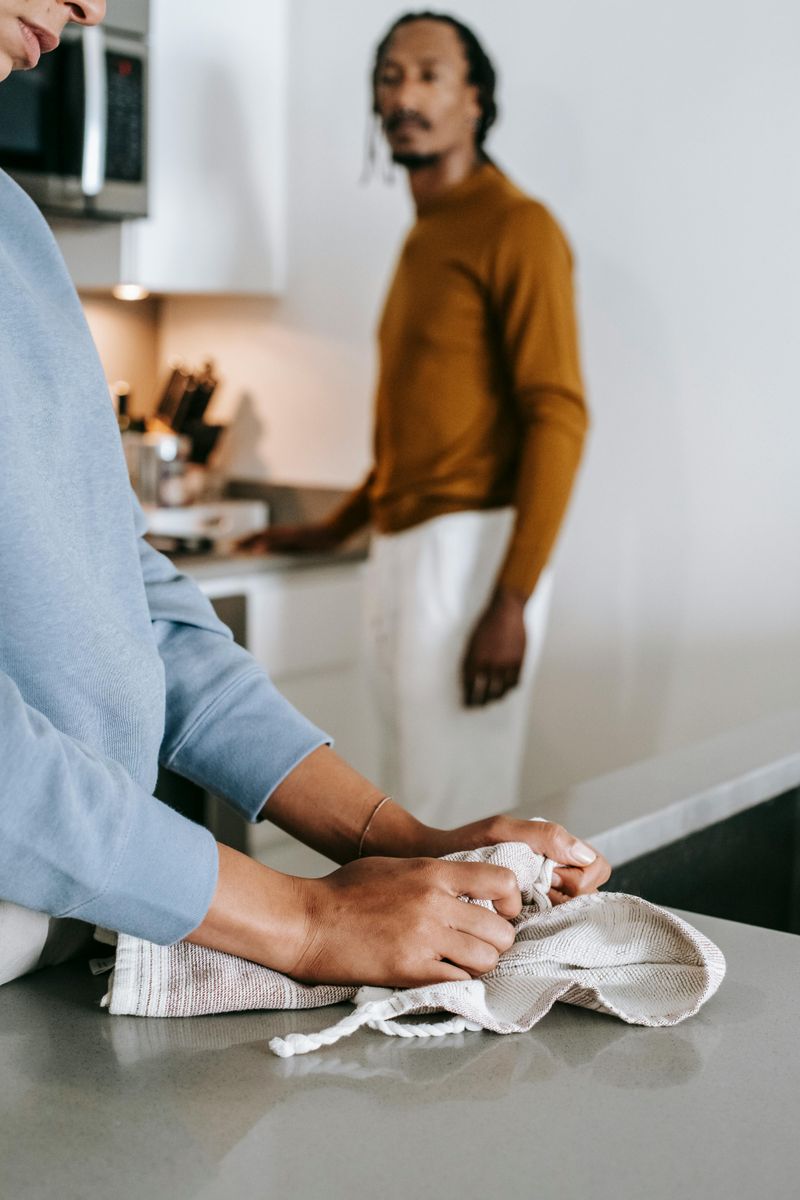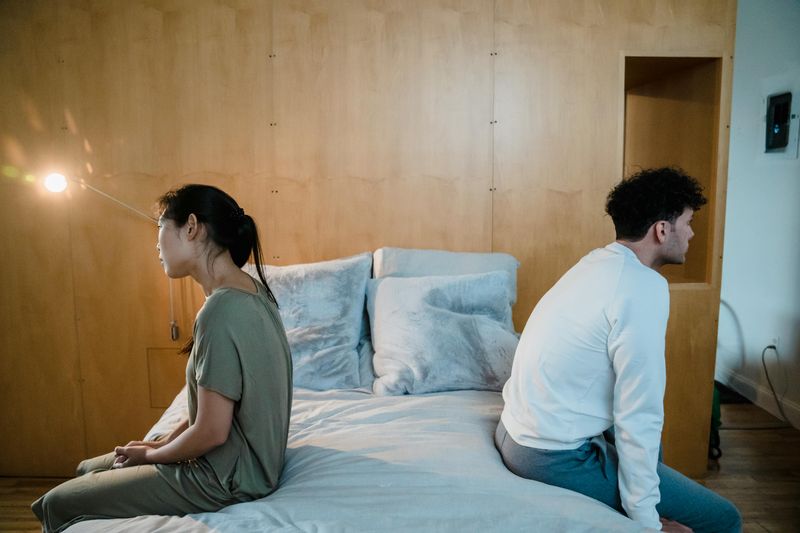17 Subtle Signs Your Marriage Runs on Fear Instead of Real Love

Marriage should be a safe haven built on trust, respect, and genuine love. But sometimes, what looks like love from the outside might actually be fear keeping two people together. When fear becomes the foundation of your relationship, it slowly chips away at happiness and connection. Recognizing these subtle signs can be the first step toward healing your marriage or making important decisions about your future.
1. Avoiding Difficult Conversations

The dinner plates are cleared, and once again, that important topic remains unaddressed. You had the perfect opening but chose silence instead of speaking up. Why? Because keeping the peace feels safer than risking an argument.
This pattern of avoidance isn’t protecting your relationship—it’s slowly suffocating it. Real love creates space for honest communication, even when it’s uncomfortable. Fear, on the other hand, builds walls of unspoken words and unresolved feelings.
When you consistently prioritize temporary harmony over addressing issues that matter, you’re choosing fear over the growth that comes with working through challenges together.
2. Constantly Seeking Approval

“What do you think?” becomes your life’s refrain. From choosing lunch to making major life decisions, your partner’s approval dictates your next move. This isn’t just being considerate—it’s surrendering your autonomy to quiet the voice of fear.
Remember when you used to confidently make choices? That version of you still exists beneath the anxiety. Healthy relationships thrive on two whole individuals bringing their authentic selves to the table, not one person dissolving into the other’s preferences.
The constant need for validation reveals a relationship running on insecurity rather than mutual respect and trust.
3. Walking on Eggshells

Your stomach tightens as you hear the front door open. Instantly, you scan the room for anything that might trigger criticism or anger. This heightened alertness isn’t normal—it’s your body’s response to emotional danger.
Living in constant vigilance means you’ve learned that being yourself carries risks. Maybe your partner’s mood swings are unpredictable, or perhaps their criticism has taught you to hide parts of who you are. Either way, this careful treading isn’t love—it’s survival.
True love creates safety to be imperfect, to make mistakes, and to show up as your complete self without fear of punishment or rejection.
4. Overanalyzing Interactions

“Did they mean something else when they said that?” Hours after a simple conversation, you’re still replaying every word, searching for hidden meanings or signs of disapproval. This mental detective work isn’t just exhausting—it’s a sign of underlying relationship insecurity.
Secure love doesn’t require constant interpretation or reading between lines. When fear drives your marriage, even neutral comments become potential landmines, keeping you perpetually on guard.
This hypervigilance reveals a painful truth: you don’t feel safe enough to take your partner’s words at face value, suggesting the foundation of trust has been compromised.
5. Sacrificing Personal Wants

“Whatever you want is fine with me” becomes your automated response, even when it’s not true. You’ve abandoned your favorite hobbies, lost touch with friends, and forgotten what brings you joy—all in service of keeping your partner happy.
Occasional compromise is healthy, but consistently abandoning your needs creates an imbalance that breeds resentment. Love thrives on mutual give-and-take, not one person constantly yielding while the other takes the lead.
When your desires consistently take a backseat, ask yourself: Are you choosing harmony out of love or surrendering your needs out of fear?
6. Fear of Being Alone

“At least I’m not single” becomes the silent mantra justifying your continued presence in an unfulfilling marriage. The thought of starting over terrifies you more than staying in a relationship that’s draining your spirit.
This fear often masquerades as commitment or loyalty, but there’s a crucial difference. Commitment stems from choosing someone daily because they enhance your life. Fear of loneliness, however, keeps you tethered to someone because the alternative seems worse.
When being together feels like the lesser of two evils rather than a positive choice, it’s time to examine whether fear, not love, is keeping your marriage intact.
7. Needing Constant Reassurance

“Do you still love me?” The question escapes your lips for the third time this week. Despite your partner’s consistent affirmations, the reassurance evaporates like morning dew, leaving you thirsty for more proof of their devotion.
This insatiable need for confirmation reveals an underlying current of fear. Rather than trusting the foundation of your relationship, you’re constantly testing its strength, searching for cracks that might not exist.
While everyone appreciates affirmation, healthy love includes a baseline of security that doesn’t require constant verbal reinforcement. When reassurance becomes as essential as oxygen, it signals fear has contaminated the relationship’s atmosphere.
8. Keeping Score

Mental spreadsheets track who last loaded the dishwasher, who sacrificed more last weekend, or who apologized first after the argument three months ago. This invisible accounting system transforms marriage from partnership into competition.
Love doesn’t calculate debt and credit—it gives freely without expectation of equal return. When you’re tallying every contribution, it suggests you don’t trust your partner to value your efforts without proof.
This scorekeeping creates an atmosphere of transaction rather than generosity. Eventually, both partners feel underappreciated, leading to withholding rather than giving—a clear sign that fear of being taken advantage of has overshadowed the joy of mutual care.
9. Feeling Trapped

The walls seem to close in whenever you think about your future. Marriage should feel like an open road of possibilities, but instead, it resembles a cage—comfortable perhaps, but confining nonetheless.
This sensation of being trapped often comes from fear-based decision making. Maybe financial dependence, family expectations, or concern about hurting your partner keeps you locked in place. Whatever the reason, the feeling of having no escape route creates a foundation of resentment rather than love.
Healthy partnerships feel like a choice you make daily, not a sentence you’re serving. When staying feels like your only option rather than your preferred one, fear has taken love’s rightful place.
10. Fear of Disapproval

Your natural laugh has been replaced by a more subdued chuckle. Your bold fashion choices now match your partner’s conservative taste. Even your political opinions have mysteriously aligned with theirs. This gradual self-editing wasn’t a conscious choice—it evolved as a protection mechanism.
When your authentic self consistently triggers your partner’s disapproval, you learn to present a more acceptable version. This isn’t adaptation; it’s erasure motivated by fear.
Love creates space for differences and celebrates individuality. When you’re constantly adjusting your authentic expression to avoid criticism, you’re responding to the threat of rejection rather than the safety of acceptance.
11. Avoiding Vulnerability

“I’m fine” becomes your standard response, even when you’re falling apart inside. Walls built brick by emotional brick now separate you from the person who once knew you best. This fortress wasn’t constructed overnight—each time sharing feelings felt unsafe, another layer of protection was added.
True intimacy requires the courage to be seen, flaws and all. When past vulnerability led to criticism, rejection, or indifference, self-protection became necessary.
But relationships without emotional transparency eventually become hollow performances. If you’re hiding your true thoughts, dreams, and hurts from your partner, ask yourself: Is this protection necessary because love isn’t safe, or has fear simply convinced you it isn’t?
12. Reluctance to Try New Things

“Maybe next time” becomes your mantra whenever opportunities for growth arise. That cooking class, career change, or adventure vacation keeps getting postponed—not because you lack interest, but because stepping outside your comfort zone feels threatening to your relationship’s stability.
Growth requires risk, but fear whispers that change might rock the boat. Perhaps your partner has subtly discouraged your evolution, or maybe you worry that becoming more might highlight the relationship’s limitations.
Loving partnerships encourage expansion rather than contraction. When you consistently reject new experiences to maintain the status quo, it suggests fear of change—or your partner’s reaction to it—has become more powerful than your natural desire for growth.
13. Overreliance on Routine

Friday night is always movie night. Saturday morning always includes the same breakfast at the same time. This rigid adherence to patterns goes beyond mere preference—it’s a safety mechanism.
While routines can provide healthy structure, clinging to them with white knuckles suggests something deeper. Spontaneity requires trust—trust that unplanned moments won’t lead to conflict, disappointment, or rejection. When deviation from the script creates anxiety, it reveals a relationship running on predictability rather than resilience.
Love embraces both consistency and surprise, finding security not in unchanging patterns but in knowing you can navigate the unexpected together. Fear, however, demands the comfort of knowing exactly what comes next.
14. Lack of Emotional Intimacy

Conversations stick to logistics and schedules—who’s picking up the kids or what’s for dinner. Deeper topics like hopes, fears, or feelings have become foreign territory, creating an invisible chasm between you despite physical proximity.
This emotional distance often develops gradually. Perhaps vulnerability was once met with dismissal, or sharing feelings led to conflict. Whatever the cause, the protective response was emotional withdrawal.
The paradox is painful: to protect the relationship from potential hurt, you’ve created actual disconnection. True love thrives on emotional transparency, while fear builds walls disguised as boundaries, leaving both partners feeling unseen and unknown.
15. Doubting Your Partner’s Love

“They probably don’t even love me anymore.” This thought ambushes you during ordinary moments—while they’re working late or when they seem distracted during conversation. Despite years together and countless expressions of commitment, you question the foundation of your relationship.
This persistent doubt isn’t rational, but fear rarely is. Perhaps past betrayal or childhood experiences taught you that love is unreliable. Maybe your partner’s changing expressions of affection trigger insecurity rather than adaptation.
Whatever the source, this continuous questioning reveals a relationship built on shifting sand rather than solid ground. Love creates security; fear manufactures doubt even in the face of evidence to the contrary.
16. Becoming a Clone of Your Partner

Friends hardly recognize you anymore. Your music playlist mysteriously matches your partner’s favorites. Even your speaking style has absorbed their unique phrases and opinions. This gradual personality merger wasn’t a conscious choice—it was survival.
When being yourself created tension or disapproval, mirroring became safer than authenticity. Perhaps your differences triggered conflict, or your partner subtly rewarded conformity with approval and affection.
Healthy love celebrates two distinct individuals choosing to journey together, maintaining their unique identities. When you’ve surrendered your individuality to become your partner’s echo, it reveals a relationship where fear of rejection has overpowered the joy of being authentically accepted.
17. Feeling Financially Dependent

The balance in your joint account keeps you awake at night. Not because it’s insufficient, but because it represents invisible chains. Whether you gave up your career for family or your earning potential is significantly lower than your partner’s, the resulting power imbalance shapes your marriage in subtle ways.
Financial dependence creates an unspoken pressure to please, to avoid rocking the boat. Your opinions might carry less weight in decisions, or you might tolerate treatment you otherwise wouldn’t.
When economic security becomes the primary reason for staying, the relationship has shifted from partnership to arrangement. Love creates equality even amid financial differences; fear creates compliance disguised as gratitude.

Comments
Loading…